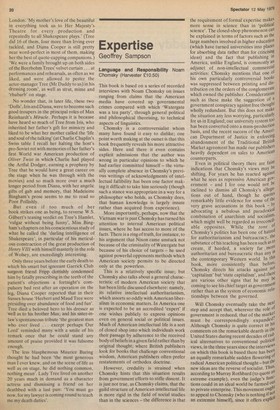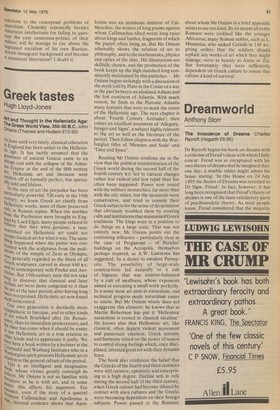Expertise
Geoffrey Sampson
Language and Responsibility Noam Chomsky (Harvester £10.50) This book is based on a series of recorded interviews with Noam Chomsky on issues ranging from claims that the American media have covered up governmental crimes compared with which 'Watergate was a tea party', through general political and philosophical theorising, to technical aspects of linguistics.
Chomsky is a controversialist whom many have found it easy to dislike; one point worth making at the outset is that this book frequently reveals his more attractive sides. Here and there it even contains explicit admissions that the author was wrong in particular opinions to which he had earlier committed himself — the virtually complete absence in Chomsky's previous writings of acknowledgments of intellectual fallibility has been one factor making it difficult to take him seriously (though such a stance was appropriate in a way for a philosopher who holds, as Chomsky does, that human knowledge is largely innate rather than acquired from experience).
More importantly, perhaps, now that the Vietnam war is past Chom sky has turned his attention to internal American political issues, where he has access to more of the facts. There is a ring of truth, for instance, to his argument that Nixon came unstuck not because of the criminality of Watergate but because of his choice of targets — he used against powerful opponents methods which American society permits to be directed only at the powerless.
This is a relatively specific issue; but Chomsky also talks about a general characteristic of modern American society that has been little discussed elsewhere: namely, its relative intellectual authoritarianism, which assorts so oddly with American liberalism in economic matters. In America one is expected to be an accredited 'expert' if one wishes publicly to express opinions even on general social or political issues. Much of American intellectual life is a sort of closed shop into which individuals work their passage by adherence to the received body of beliefs in a given field rather than by original thought; where British publishers look for books that challenge conventional wisdom, American publishers often prefer restatements of orthodox doctrine.
However, credulity is strained when Chomsky hints that this situation results from government efforts to stifle dissent. It is just not true, as Chomsky claims, that the guild structure of American intellectual life is more rigid in the field of social studies than in the sciences — the difference is that the requirement of formal expertise makes more sense in science than in 'political science'. The closed-shop phenomenon can be explained in terms of factors such as the large numbers involved in higher education (which have turned universities into places for absorbing data rather than for criticising ideas) and the fact that publishing in America, unlike England, is commonly an adjunct of non-intellectual commercial activities: Chomsky mentions that one of his own particularly controversial books was suppressed between printing and distribution on the orders of the conglomerate which owned the publisher. Considerations such as these make the suggestion of 'a government conspiracy against free thought wholly redundant. But this does not make the situation any less worrying, particularlY for us in England; our university system too has been converted onto a mass-production basis, and the recent success of the American Department of Justice in enforcing abandonment of the Traditional British Market agreement has made our published heavily dependent on sales to American counterparts. Even in political theory there are faint indications that Chomsky's views may be shifting. For years he has reacted against what he sees as repressive American guyernment — and I for one would not be inclined to dismiss all Chomsky's allegations out of hand, though he quotes remarkably little evidence for some of the very grave accusations in this book — b); advocating a nebulous and paradoxical combination of anarchism and socialisin, which might well be regarded as irreconcil' able opposites. While the tone 61,, Chomsky's politics has been one of hatre° for authoritarianism and bureaucracy, the substance of his teaching has been such as t° create, if heeded, a society far more authoritarian and bureaucratic than any in the contemporary Western world. In this book, more consistently than before, Chomsky directs his attacks against clot 'capitalism' but 'state capitalism', and there are various other signs that he may he coming to see his chief target as government rather than as the system of economic NW' tionships between the governed.
Will Chomsky eventually take the next, step and accept that, wherever the role ut government is reduced, that of the marke must be correspondingly expanded' Although Chomsky is quite correct in his comments on the remarkable dearth in the United States during recent decades of rad; ical alternatives to conventional politica' views, in the three years since the interviews on which this book is based there has been, an equally remarkable sudden flowering 01 radical American political thought — but the new ideas are the reverse of socialist. Thus' according to Murray Rothbard (to quote an extreme example), even the judge's functions could in an ideal world be farmed uut to private enterprise. This movement °tett to appeal to Chomsky (who is nothing if 01 an extremist himself), since it offers exPlici solutions to the conceptual problems of anarchism. Chomsky repeatedly berates American intellectuals for failing to question the easy consensus-politics of their in. ilieu; will he manage to rise above the ingrained socialism of his own RussianJewish immigrant background and become a consistent libertarian? I doubt it.



































 Previous page
Previous page